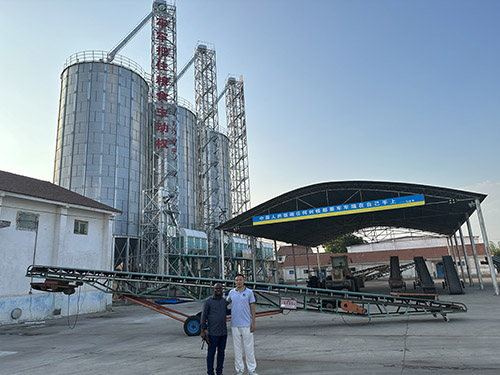Barley, as an important ingredient in beer brewing and feed processing, directly affects the quality of downstream products. Barley grain silo factory, as a key link in barley storage, play a significant role in ensuring barley quality through their production processes and quality control.

The production process of a barley grain silo factory begins with raw material reception. The factory must establish a strict raw material acceptance system to inspect the quality of incoming barley, including moisture content, impurity content, and moldy grain ratio. Only barley that meets quality standards is accepted and enters the subsequent storage process. Qualified barley is transported into the silo via conveyance equipment, while unqualified barley is returned or exchanged, ensuring the quality of stored barley from the source.
Once barley is stored in the silo, the factory must manage it scientifically to maintain its quality. First, the storage conditions, such as temperature and humidity, are set based on factors like the barley's variety and moisture content. Typically, barley's storage temperature should be kept below 15℃, and relative humidity below 70%. This inhibits microbial growth and barley respiration, minimizing losses.
Secondly, the barley in the silo undergoes regular inspections to monitor quality changes. Manual or automated detection equipment checks the barley's moisture, temperature, and pest conditions. Any issues are promptly identified and addressed. For instance, if high moisture is detected, ventilation or drying measures are taken; if pests are found, fumigation or physical control methods are applied.
Additionally, the silo must also take measures to prevent rodent, bird, and pest damage to the barley. By setting up rodent and bird nets and regularly placing traps, the harm of pests to barley is minimized.
When customers need to purchase barley, the factory releases barley from the silo according to the order requirements. During the outbound process, it is essential to ensure that the quality of the barley is not contaminated or damaged. After being released from the silo, the barley is transported to the packaging workshop via conveyance equipment for packaging. The packaging materials must meet food hygiene standards to ensure the quality and safety of the barley during transportation and sales.

Barley grain silo factory need to establish a comprehensive quality management system that covers all aspects, including raw material procurement, storage management, and outbound distribution. By setting strict quality management systems and operating procedures, clear quality requirements and control measures are ensured for each link.
The factory must establish a quality monitoring system to monitor key quality control points in the production process in real-time. For example, installing temperature and humidity sensors, gas detectors, and other equipment in the silo allows for real-time monitoring of the silo's environmental conditions and changes in barley quality. Once any abnormal situation is detected, the system automatically alarms and takes corresponding control measures to prevent quality issues.
Barley grain silo factory should focus on quality improvement and continuously enhance the storage quality of barley. By collecting customer feedback and conducting internal quality analysis, opportunities for quality improvement are identified. For instance, if customers report that barley tends to clump during storage, the factory can analyze the cause and improve the silo's ventilation system or adjust storage conditions to reduce clumping.